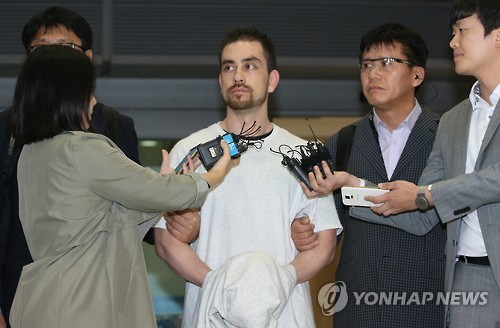A Seoul court will call in Korean-American Edward Lee, who was cleared of murdering a South Korean college student 18 years ago, to take the witness stand in the fresh trial of new murder suspect Arthur John Patterson.
Lee, 36, who recently returned to Korea, will accept the prosecution’s request to testify as a witness in the trial set to begin Thursday, his father said in an interview with a local news outlet. The father said Lee is willing to take the stand to get “the wrong path” set straight.
Patterson, 35, was extradited to Korea on Sept. 23 to face a new trial on charges of stabbing Cho Joong-pil to death in 1997 at a Burger King restaurant in Itaewon, a multicultural district frequented by expats residing in Seoul.
 |
(Yonhap) |
Lee and Patterson, both teenagers at the time, accused each other of murdering Cho, who was found on the restroom floor with several wounds to his neck. Cho died on the way to a hospital.
Patterson was in Seoul as his father was a civilian worker for the U.S. military, which has maintained a large presence in South Korea to deter North Korean aggression since the 1950-53 Korean War.
In what many see as a botched probe, the prosecution initially indicted Lee on a murder charge, with an appeals court sentencing him to 20 years in jail. But Lee was later acquitted of the murder for lack of evidence in the retrial ordered by the highest court.
Patterson, on the other hand, was indicted on lesser charges including elimination of evidence and possession of a dangerous weapon. He was handed down 18 months in jail, but freed in a special amnesty move before finishing his term in 1998.
A year later, prosecutors launched a new probe into the murder case, viewing Patterson as the prime suspect. But Patterson fled to the U.S. as the government failed to renew his travel ban.
The long-forgotten case was brought back to the spotlight with the release of a 2009 film on the murder.
Amid mounting public calls to extradite Patterson, prosecutors indicted him on a murder charge in 2011 after the 35-year-old man was caught in the U.S.
Patterson had attempted to delay extradition by submitting multiple habeas corpus petitions to U.S. courts until his petition was finally rejected and he was extradited to Korea.
Now, eyes are on the Patterson case amid the public furor as South Koreans remain largely sour toward crimes committed by foreigners, especially those involving the U.S. military.
In accordance with the Status of Forces Agreement signed between South Korea and the U.S. in 1966, American soldiers and those working for them here are not subjected to Korean jurisdiction.
The case also rekindled a debate over what many see as the incompetence of the police and prosecutors who accused the wrong person for the murder in the first place.
By Ock Hyun-ju (
laeticia.ock@heraldcorp.com)








![[Today’s K-pop] Blackpink’s Jennie, Lisa invited to Coachella as solo acts](http://res.heraldm.com/phpwas/restmb_idxmake.php?idx=644&simg=/content/image/2024/11/21/20241121050099_0.jpg)